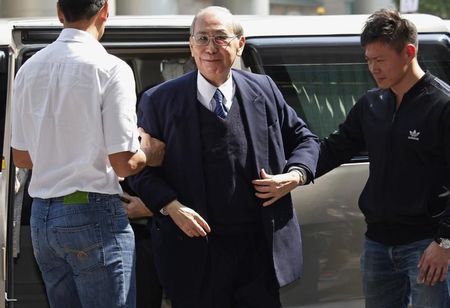HONG KONG (Reuters) - A former top Hong Kong civil servant told a court on Tuesday that he had received a secret payment of HK$11 million (£866,046) "from Beijing" in 2007 through a businessman intermediary, local media reported.
Hong Kong's former chief secretary, Rafael Hui, was testifying in one of the financial hub's largest corruption trials, charged with accepting "concealed and disguised" payments from property tycoons Thomas and Raymond Kwok, the billionaire co-chairmen of Asia's largest developer, Sun Hung Kai Properties Ltd, seeking government favour.
Hui's testimony broadens the corruption implications of the case beyond Hong Kong, which returned to Chinese rule in 1997, and raises new questions on the ties between Hong Kong and Chinese officials.
The case involves a series of payments and loans totalling more than HK$37 million allegedly paid to Hui, who headed Hong Kong's civil service from 2005 to 2007.
Hui told the High Court that one particular payment worth some HK$11 million had been facilitated by Liao Hui, the influential former head of China's Hong Kong and Macau Affairs Office in Beijing, Hong Kong's public broadcaster RTHK reported.
Hui told the court that during a meeting with Liao in Hong Kong in 2007, Liao had asked him to stay in his post for longer.
Hui had declined, saying he had financial difficulties and that he'd prefer a higher-paying private sector job, RTHK reported.
Hui cited Liao as saying that he would think of ways to help him out financially.
Around half a year later, a former stock exchange official, Francis Kwan, approached Hui, after he had stepped down as chief executive, to say that "someone from Beijing" had contacted him and that there was now some money available, Hui told the court.
He said he accepted the money, though it was not immediately clear what the payment was for.
The source wasn't immediately made clear to Hui. But in 2008, on the sidelines of a meeting in Beijing, Liao suggested he had played a role.
"I've now helped you. Don't overspend any more," Hui quoted Liao as saying to him at the time.
The case has thrown a spotlight on the close relationship between the city's powerful developers and government in the former British colony, which returned to Chinese rule with wide-ranging autonomy and a separate legal system from the mainland.

Liao was one of China's most experienced officials overseeing Hong Kong affairs during his time as director of the Hong Kong and Macau Affairs office - a high-level body under the State Council, or China's cabinet, in the years after 1997.
(Reporting by James Pomfret; Editing by Nick Macfie)
